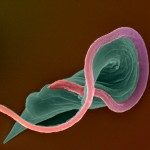Lien vers Pubmed [PMID] – 27475118
Mol. Biochem. Parasitol. 2016 Sep - Oct;209(1-2):104-113
The parasitic protozoa Trypanosoma brucei and Plasmodium falciparum are lethal human parasites that have developed elegant strategies of immune evasion by antigenic variation. Despite the vast evolutionary distance between the two taxa, both parasites employ strict monoallelic expression of their membrane proteins, variant surface glycoproteins in Trypanosomes and the var, rif and stevor genes in Plasmodium, in order to evade their host’s immune system. Additionally, both telomeric location and epigenetic controls are prominent features of these membrane proteins. As such, telomeres, chromatin structure and nuclear organization all contribute to control of gene expression and immune evasion. Here, we discuss the importance of epigenetics and sub-nuclear context for the survival of these disease-causing parasites.

